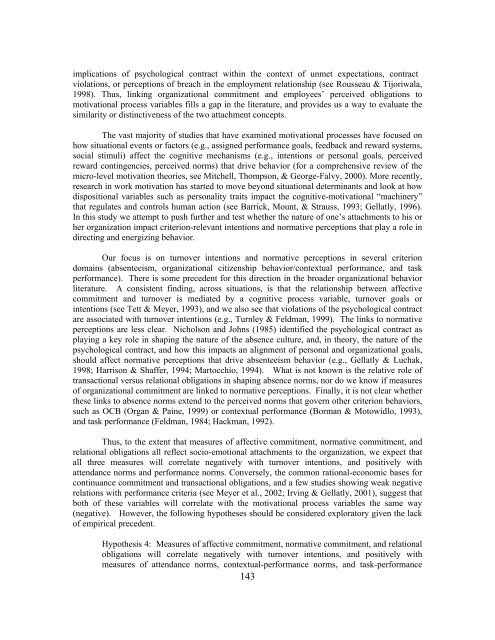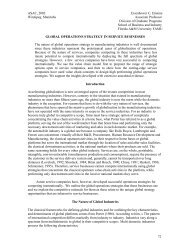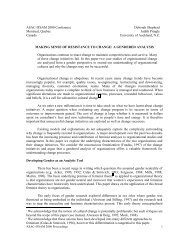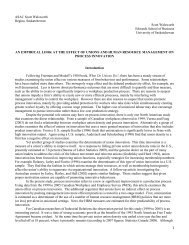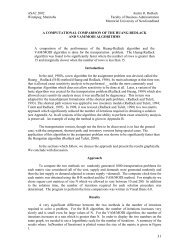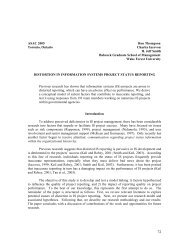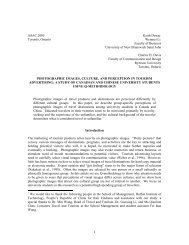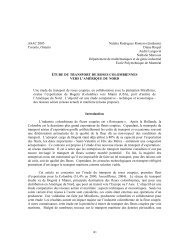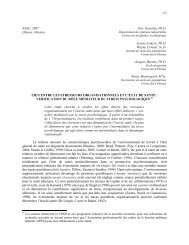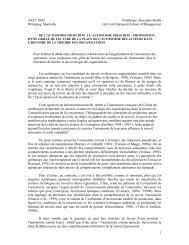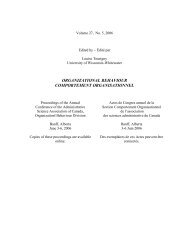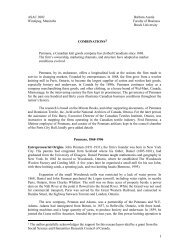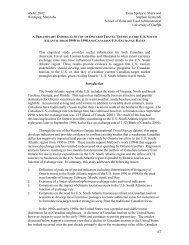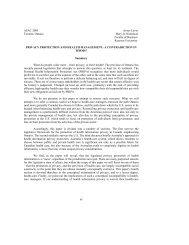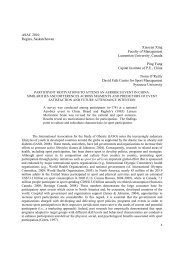The third component in the commitment model, normative commitment, is based on anemployee’s feeling of personal obligation to stay with an organization or to remain committed toa course of action (Meyer & Allen, 1997; Meyer & Herscovitch, 2001). Despite factor analyticresearch that has supported the distinctiveness of affective and normative commitment (e.g.,Allen & Meyer, 1996), correlations between these components tend to be high. In addition,affective commitment and normative commitment share the same pattern of correlations with anumber of key outcome variables, although these correlations tend to be stronger for affectivecommitment (Meyer at al., 2002). Meyer and Allen (1997) have speculated that the parallelfindings often found in research with affective and normative commitment may indicate that“some types of positive experiences influence feelings of emotional attachment and feelings ofobligation at the same time” (p. 63). Perhaps for these reasons, the majority of commitmentresearch examining the three-component model has focused on affective and continuancecommitment.Because of the implied exchange of obligations, normative commitment is viewed asbeing most closely linked to psychological contracts. Meyer and colleagues (Meyer & Allen,1997; Meyer & Herscovitch, 2001), for example, speculated that it was this notion of obligationsthat made normative commitment relevant to psychological contracts, particularly perceivedrelational obligations. Recent research by Irving and Bobocel (2001) found that relationalobligations accounted for a significant amount of variance in normative commitment, even aftercontrolling for affective commitment. These findings suggest that relational obligations may bean important predictor in the development of normative commitment. However, before we canconclude that this is the case, it is important to establish whether measures of relationalobligations are empirically distinct or indistinct from measures of normative commitment.Hypothesis 3: Measures of normative commitment and relational obligations will beempirically indistinctAssessing Relations to Motivational Process VariablesAnother way of assessing the degree of similarity or overlap between the threecomponents of organizational commitment and employee’s perceived obligations was to assesstheir relations to other concepts within the broader nomological network. Of particular interesthere is to observe how the attachment concepts relate, if at all, to several motivational processvariables with known links to actual on-the-job behaviors such as absenteeism, job performance,and turnover. The rationale and description of a general process model now follows.<strong>Organizational</strong> researchers are interested in studying organizational commitment and thecomponent of psychological contracts reflecting employees’ perceived obligations because eachis believed to play a role in determining work behaviors, such as attendance, job performance,citizenship behavior/contextual performance, and turnover. Although many empirical studiesreport bivariate correlations between one or more components of commitment and a variety ofdifferent behavioral outcomes (for reviews, see Meyer & Allen, 1997; Meyer et al., 2002), verylittle research attention has been focused on explaining how an attitudinal disposition, likeorganizational commitment, affects behavior. The same is true for perceived obligations. Whilethere is growing empirical evidence that measures of psychological contract correlate with workoutcomes such as citizenship behavior (e.g., Robinson & Morrison, 1995), turnover (e.g., Turnley& Feldman, 1999) and job performance (see Irving & Gellatly, 2001), few studies have examinedhow perceived obligations impact behavior. It is much more common to discuss the behavioral142
implications of psychological contract within the context of unmet expectations, contractviolations, or perceptions of breach in the employment relationship (see Rousseau & Tijoriwala,1998). Thus, linking organizational commitment and employees’ perceived obligations tomotivational process variables fills a gap in the literature, and provides us a way to evaluate thesimilarity or distinctiveness of the two attachment concepts.The vast majority of studies that have examined motivational processes have focused onhow situational events or factors (e.g., assigned performance goals, feedback and reward systems,social stimuli) affect the cognitive mechanisms (e.g., intentions or personal goals, perceivedreward contingencies, perceived norms) that drive behavior (for a comprehensive review of themicro-level motivation theories, see Mitchell, Thompson, & George-Falvy, 2000). More recently,research in work motivation has started to move beyond situational determinants and look at howdispositional variables such as personality traits impact the cognitive-motivational “machinery”that regulates and controls human action (see Barrick, Mount, & Strauss, 1993; Gellatly, 1996).In this study we attempt to push further and test whether the nature of one’s attachments to his orher organization impact criterion-relevant intentions and normative perceptions that play a role indirecting and energizing behavior.Our focus is on turnover intentions and normative perceptions in several criteriondomains (absenteeism, organizational citizenship behavior/contextual performance, and taskperformance). There is some precedent for this direction in the broader organizational behaviorliterature. A consistent finding, across situations, is that the relationship between affectivecommitment and turnover is mediated by a cognitive process variable, turnover goals orintentions (see Tett & Meyer, 1993), and we also see that violations of the psychological contractare associated with turnover intentions (e.g., Turnley & Feldman, 1999). The links to normativeperceptions are less clear. Nicholson and Johns (1985) identified the psychological contract asplaying a key role in shaping the nature of the absence culture, and, in theory, the nature of thepsychological contract, and how this impacts an alignment of personal and organizational goals,should affect normative perceptions that drive absenteeism behavior (e.g., Gellatly & Luchak,1998; Harrison & Shaffer, 1994; Martocchio, 1994). What is not known is the relative role oftransactional versus relational obligations in shaping absence norms, nor do we know if measuresof organizational commitment are linked to normative perceptions. Finally, it is not clear whetherthese links to absence norms extend to the perceived norms that govern other criterion behaviors,such as OCB (Organ & Paine, 1999) or contextual performance (Borman & Motowidlo, 1993),and task performance (Feldman, 1984; Hackman, 1992).Thus, to the extent that measures of affective commitment, normative commitment, andrelational obligations all reflect socio-emotional attachments to the organization, we expect thatall three measures will correlate negatively with turnover intentions, and positively withattendance norms and performance norms. Conversely, the common rational-economic bases forcontinuance commitment and transactional obligations, and a few studies showing weak negativerelations with performance criteria (see Meyer et al., 2002; Irving & Gellatly, 2001), suggest thatboth of these variables will correlate with the motivational process variables the same way(negative). However, the following hypotheses should be considered exploratory given the lackof empirical precedent.Hypothesis 4: Measures of affective commitment, normative commitment, and relationalobligations will correlate negatively with turnover intentions, and positively withmeasures of attendance norms, contextual-performance norms, and task-performance143
- Page 1 and 2:
Volume 24, No. 5, 2003Edited by/Éd
- Page 4 and 5:
Pursey HeugensGreg IrvingRoderick I
- Page 6 and 7:
TABLE OF CONTENTS - TABLE DES MATI
- Page 8 and 9:
study of power displays in mixed-ge
- Page 10 and 11:
on expectations and behaviour (Berg
- Page 12 and 13:
TaskThis study required the use of
- Page 14 and 15:
Task-Gender (male-stereotyped or fe
- Page 16 and 17:
It is important to understand the s
- Page 18 and 19:
Crown, C.L. & Cummins, D.A. (1998).
- Page 20 and 21:
Smith-Lovin, L., & Brody, C. (1989)
- Page 22 and 23:
Table 2Summary of Descriptive Stati
- Page 24 and 25:
Table 4Summary of Interaction of Ge
- Page 26 and 27:
ASAC 2003Halifax, Nova ScotiaIain L
- Page 28 and 29:
the interrelationships among the MB
- Page 30 and 31:
studies (Friedman and Sarros, 1989;
- Page 32 and 33:
This study demonstrated that emotio
- Page 34 and 35:
Anxiety, Stress and Coping, in pres
- Page 36 and 37:
Washington, DC: Taylor and Francis,
- Page 38 and 39:
Table 2Overall Goodness-of-Fit Indi
- Page 40 and 41:
ζ 3Depersonalizationη 3β 3,1 (+)
- Page 42 and 43:
ASAC 2003Halifax, Nova ScotiaWendy
- Page 44 and 45:
views independently, gave rise to S
- Page 46 and 47:
track assistant, associate, and ful
- Page 48 and 49:
ole conflict are positively related
- Page 50 and 51:
Table 3. Regression of climate and
- Page 52 and 53:
interests.We speculate the null eff
- Page 54 and 55:
DOOP and short for DOOP scales,”
- Page 56 and 57:
Pelled, L. H., “Demographic diver
- Page 58 and 59:
esulting increase in discretion ove
- Page 60 and 61:
al., 1995). However, the distinctio
- Page 62 and 63:
ise to strong pressures for conform
- Page 64 and 65:
presented with a complete list of a
- Page 66 and 67:
Table 3QAP Regression Coefficients
- Page 68 and 69:
ConclusionResearchers of social inf
- Page 70 and 71:
suggestions for further research.
- Page 72 and 73:
performing on the job.” Presumabl
- Page 74 and 75:
positively related to performance i
- Page 76 and 77:
proposed hypotheses were supported.
- Page 78 and 79:
ConclusionThis research has made se
- Page 80 and 81:
Be more enthusiastic and exert extr
- Page 82 and 83:
Table 2Correlations Among the Laten
- Page 84 and 85:
performance expectations on feedbac
- Page 86 and 87:
changements qui s’opèrent dans l
- Page 88 and 89:
structures, politiques, systèmes,
- Page 90 and 91:
comportements liés à la communica
- Page 92 and 93:
Tableau 2Échelles de mesure de la
- Page 94 and 95:
prédiction des compétences clés
- Page 96 and 97:
organisation n’est pas uniforme e
- Page 98 and 99: complètement ce construit. Ces cha
- Page 100 and 101: Wagner, R.K. and Sternberg, R.J. (1
- Page 102 and 103: What is a toxin handler?In two arti
- Page 104 and 105: potentially limited scope and conte
- Page 106 and 107: work role demands. In this survey,
- Page 108 and 109: The three factors in this rotated f
- Page 110 and 111: and service orientation, the abilit
- Page 112 and 113: ASAC 2003Halifax, Nova ScotiaLisa M
- Page 114 and 115: self-appraisal group reacted more n
- Page 116 and 117: effect of voice are the value-expre
- Page 118 and 119: “Strongly Disagree” to “Stron
- Page 120 and 121: esults suggest that incorporating s
- Page 122 and 123: Personality and Social Psychology,
- Page 124 and 125: Table 1Means, Standard Deviations,
- Page 126 and 127: Table 3Test of the Mediating Role o
- Page 128 and 129: ASAC 2003Halifax, Nova ScotiaAnn Fr
- Page 130 and 131: individual level, polychronicity is
- Page 132 and 133: construct.Drawing on computer-media
- Page 134 and 135: Consequence: Impact on Work Overloa
- Page 136 and 137: Conversation complexity may also mo
- Page 138: Implications for practiceFuture res
- Page 141 and 142: ReferencesAncona, D.G., Goodman, P.
- Page 143 and 144: no. 3 (1994): 381-391.Macan, T.H.,
- Page 145 and 146: ASAC 2003Halifax, Nova ScotiaIan R.
- Page 147: Assessing Measures: Affective Commi
- Page 151 and 152: commitment, affective commitment, c
- Page 153 and 154: Motivational Process Variables. Amo
- Page 155 and 156: DiscussionThe main purpose of this
- Page 157 and 158: approaches zero. In the present stu
- Page 159 and 160: Extension and test of a three-compo
- Page 162 and 163: Table 1Descriptive Statistics and Z
- Page 164 and 165: Table 3Standardized Factor Loadings
- Page 166 and 167: Table 5Hierarchical Regression Anal
- Page 168 and 169: ASAC 2003Halifax, Nova ScotiaJoan F
- Page 170 and 171: ASAC 2003Halifax, Nova ScotiaArla D
- Page 172 and 173: ASAC 2003Halifax, Nova ScotiaIvy Ky
- Page 174: ASAC 2003Halifax, Nova ScotiaNina D


